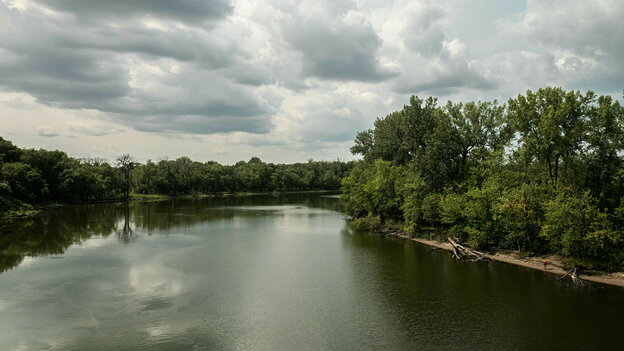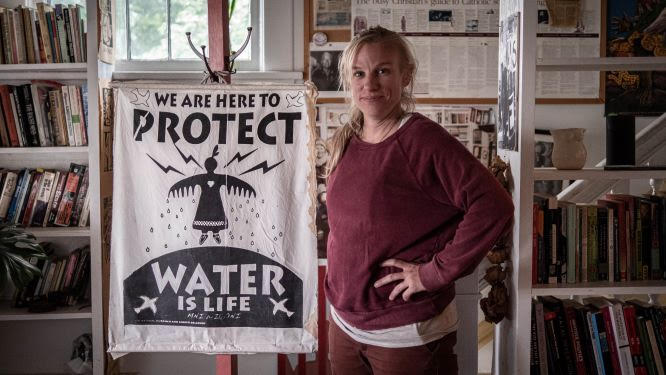Sentenced to eight years in prison for acts of sabotage, water protector Jessica Reznicek reflects on her faith-driven resistance.
By Cristina Yurena Zerr This article was first published in the German newspaper taz, and has been translated and edited for Waging Nonviolence.
On June 28, the federal court in Des Moines, Iowa was silent and filled to capacity. Fifty people were there to witness the sentencing of 40-year old Jessica Reznicek, charged with “conspiracy to damage an energy production facility” and “malicious use of fire.” The prosecution, asking for an extended sentence, argued that Reznicek’s acts could be classified as domestic terrorism.
This was not the first time Reznicek had been on trial, but this time she was facing a prison sentence of up to 20 years.
Sitting across from her was U.S. District Court Judge Rebecca Goodgame Ebinger, the prosecutor and an FBI agent. Numerous police officers in bulletproof vests stood around the courtroom. The defendant was called upon to give her closing speech.
In her loud, clear voice, Reznicek told them about her strong connection to the water. In her childhood she regularly went to the river to swim and play. But that’s no longer possible, she said, because the two rivers that run through Des Moines — Iowa’s capital — are now poisoned by agrobusiness pesticides and waste.
It was for these very personal reasons that she decided to fight the construction of the Dakota Access Pipeline, Reznicek told those in attendance. At least eight leaks, she explained, had already occurred in 2017, with 20,983 gallons of crude oil leeching into soils and the waterways. “I was acting out of desperation,” she said, describing her motivations for sabotage.
“Indigenous tradition teaches us that water is life. Scripture teaches that in the beginning, God created the waters and the earth and that it was good.” With these words, she ended her closing argument. The prison sentence followed shortly thereafter: eight years in federal prison, three years of probation, and a restitution of $3,198,512.70 to the corporation Energy Transfer.

On July 24, 2017 — two years before sentencing — Jessica Reznicek can be seen in a shaky video with her activist partner Ruby Montoya, a former elementary school teacher who was 27 at the time. They stand in front of a group of journalists next to a busy street. The speech they give would drastically change their lives.
After several months of secretly sabotaging one of the country’s most controversial construction projects, the two women, whose paths would later part, went public. “We acted for our children because the world they inherit does not meet their needs. There are over five major bodies of water here in Iowa, and none of them are clean. After having explored and exhausted all avenues of process, including attending public hearings, gathering signatures for valid requests for environmental impact statements, participating in civil disobedience, hunger strikes, marches and rallies, boycotts and encampments, we saw the clear refusal of our government to hear the people’s demands.”
That’s why Reznicek and Montoya burned five machines at a pipeline construction site in Iowa on election night in November 2016. They would later change their methods, using a welding torch to dismantle the pipeline’s surface-mounted steel valves, delaying construction by weeks. “After the success of this peaceful action, we began to use this tactic up and down the pipeline, throughout Iowa,” the two women say.
But no media reported on their activities; the corporation cited other — false — reasons for the delay. When the activists noticed during an action that oil was already flowing in the pipes, they decided to go public, as they had to admit a kind of defeat.
The two women appear clear and determined on this day in the summer of 2017 as they take turns reciting their pre-written text. “If there are any regrets, it is that we did not act enough.” They end their speeches and are led away in handcuffs by three police officers.
Using the slogan “Mni wiconi,” meaning “Water is Life,” in the Lakota (Sioux) language, a broad movement was organized in 2016 against the construction of the Dakota Access Pipeline. The protest of the Standing Rock Sioux tribe garnered national and international attention.
The tribe sees the construction of the pipeline as a threat to their water supply because the pipeline runs under Lake Oahe, which is near the reservation. Other bodies of water are also at risk because the pipeline crosses under rivers and lakes in many places, which could contaminate the drinking water of many people in the event of an accident. In addition, ancient burial sites and sacred places of great cultural value would be threatened by the construction. Opponents of the pipeline speak of ecological racism — not only because Indigenous rights to self-government would be curtailed, but also because the construction of so-called Man Camps (temporary container cities for construction workers who move from other states) would lead to prostitution and an increase in violence against Indigenous women.
Their government — the Sioux Tribe is a sovereign nation — issued a resolution back in 2015 saying the pipeline “poses a serious risk to the very survival of our tribe and […] would destroy valuable cultural resources.” Construction would also break the Fort Laramie Treaty, which guarantees them the “undisturbed use and occupation” of reservation land. But their arguments went unheard by both the company and the government.
The operating company said the pipeline would not harm the environment, would not affect Indigenous rights and would not pose a threat to drinking water supplies. But the protest, which stretches across several states along the pipeline, has developed into one of the largest environmental movements in the United States. Native Americans from different nations and reservations are joining, along with landowners, environmental organizations and left-wing autonomous movements.
Reznicek first heard about the pipeline when she was released from prison six years ago, after serving a two-month stint for her protest against a U.S. military weapons contractor in Omaha, Nebraska. An organizer from Standing Rock had come to Des Moines to mobilize people for the protest. “I decided that I wanted to learn more about Indigenous ceremony, understanding that I am a white person, I cannot just go in and express my demands. And I also wanted to focus on stopping the Dakota Access Pipeline Project. So I drove up to Standing Rock.”
Where it all began
On a road on the outskirts of Des Moines — a city home to numerous insurance companies — large trees tower above the wooden row houses, providing shade on a hot July day.
Above the porch of one of the houses hangs a small sign that reads “Catholic Worker House.” In front of the back part of the building are tables and benches with people sitting on them. Music is playing, people are singing, someone is asleep on a bench.
In the kitchen of the house, Jessica Reznicek stands in front of the stove and slices five chicken breasts, freeing the meat from the bones. Next to them is a large pot of mashed potatoes, into which she generously spreads butter. “Our guests love butter,” Reznicek laughs. The kitchen looks as if many meals have been cooked there. Posters with anti-war messages and protest slogans are hung around the small room. On the windowsill in front of Reznicek is a statue of a bishop with a rosary around his neck.
Twice a week, Jessica Reznicek cooks for the homeless guests who come here. Usually they eat together in the living room, but since the outbreak of the coronavirus pandemic, the food is distributed through the window.
“I like the days when I’m in charge of the kitchen. It takes my mind off all the things that are going on in my head,” Reznicek says as she begins washing a mountain of dishes.
Two years have passed since her protests were made public. A year ago, Jessica Reznicek moved back into the community, spending time there on house arrest. Here, where it all began, her long journey ends. She has one week left before needing to report to prison.
Just before the food is served, the kitchen and living room fill up. Two of Reznicek’s friends are there, residents of the house and volunteers from outside — together they begin to serve food to the guests.
Reznicek has been in and out of the house for 10 years. Most people know her story: “The one who blew up the pipeline?” asks Jimmy — one of the homeless guests — laughing as he tastes the still-warm mashed potatoes. The fact that she will soon be gone saddens many of the residents. For the majority of them, prison is a familiar place. But no one here has been incarcerated as long as Jessica Reznicek will be.
The Dingman House, named after a late bishop in Des Moines, is one of four side-by-side buildings of the Catholic Worker community. Christianity and anarchism meet here. In these self-organized “houses of hospitality,” which function independently of the church, people live and work among the poor in the spirit of the Sermon on the Mount. The Christian message of social justice and solidarity with the marginalized becomes everyday practice. There is not much overlap with the institutional Catholic Church. In the bathroom, where homeless guests can shower, there are free condoms; trans people find shelter here and women sometimes lead church services.
Preparations for prison
The Berrigan House across the street — named after two priests who became known for their actions of civil disobedience against the Vietnam War — has always been a place of resistance, where protest actions are planned and activists find shelter. This is where Reznicek prepared her actions against the pipeline.
As in the house next door, the walls are covered with posters calling for resistance against war, racism and injustice. It is a colorful, chaotic and untidy atmosphere. Reznicek and her friends Alex and Monty sit at the table in the living room. The two are among her closest supporters. They just had a video conversation with Reznicek’s lawyer to discuss the final steps before she goes to jail.
A month after Reznicek is sentenced to eight years in prison, they launched a campaign called “Water Defenders Are Never Terrorists.” Within a few weeks, they were able to collect thousands of signatures. Their goal: a petition to President Joe Biden and Congress demanding the terrorism charges be dropped.
The list of things to do before Reznicek goes to prison is long: return the electronic ankle bracelet, pick up the copy of her high school transcript she needs so she won’t have to attend classes in jail. T-shirts demanding her release are to be printed. Reznicek also wants to develop photos that Alex will later send to her in prison so she can decorate her cell with them. But they also want to see her favorite musical Rent, go dancing one more time, invite friends and celebrate. There is a lot of laughter when the three get together.

After the meeting, Jessica Reznicek packs a vacuum cleaner and cleaning supplies and heads out. With permission from her probation officer, she started cleaning private homes a year ago. She also worked at a pizzeria from time to time.
Why is Jessica Reznicek willing to spend eight years of her life in prison because of her commitment to clean water? She was studying political science in Des Moines and married when she learned about the Occupy Wall Street movement in 2011. Shortly after, she decided to go to New York for the protests. This meant the end of her marriage. From the East Coast, she began a new life of sorts, always on the move, searching for a way to make her contribution to a more just world.
Reznicek traveled twice to Palestine and Israel, where she was deported for protesting in solidarity with the Palestinian people. She visited the Zapatistas in Mexico and spent time in Central America with the Indigenous people of Guatemala. In South Korea, she protested the construction of a U.S. Navy base. “So I feel like all of these experiences culminated at this point in my life when I heard about the Dakota Access Pipeline.”
The Catholic Worker community in Des Moines was central to her politicization. She stumbled upon the organization after returning to Iowa from New York. There begins what she later calls a conversion: a return to the Christian faith and her Catholic roots. At the same time, this means a radicalization in the struggle against injustice: Jesus Christ is seen Catholic Workers as a revolutionary who stood up for the disenfranchised, for the weak and the poor. He wanted to drive the kings from their thrones and bring justice. And he died on the cross without resisting his judgement.
Three months after Jessica Reznicek made her actions public in 2017, the Berrigan home was surrounded by the FBI. “It was like 4:30 in the morning when they were pounding on the door. The house was actually shaking. I ran downstairs and could see around 50 agents through the window with big guns and vests.”
When she opened the door, the house was stormed by about 50 uniforms. She was thrown to the ground and held at gunpoint, she said.
She then spent a year in hiding, calling it her wanderings. “I wasn’t necessarily underground. I think that I was running and I was hiding, but it was not exclusively from the federal government. I was not hiding from prison. I was hiding from everything.”
When she broke down after 10 months in Colorado, she finally realized she needed help. It won’t come from people or places, Reznicek says, but from her relationship with God. After this experience, she realized she wanted to live in a place where she could encounter God, so she decided to enter a Benedictine convent as a novice. But no sooner does she arrive than Reznicek is again picked up by the FBI and charged. They send her back to Des Moines — to the Berrigan home — to await the verdict under house arrest.
For the last four days before she goes to prison, Jessica Reznicek was given permission to visit the sisters at the convent community in Duluth. After her incarceration, she would like to move there or — if that’s not possible — live as close to the convent as she can.
On August 11th, Benedictine sisters drove Jessica Reznicek to the women’s prison in Wascea, Minnesota, four hours away. There, 714 women currently live behind the walls and fences.
Three hundred miles to the north is the town of Bemidji, home of Energy Transfer, the energy company to which Reznicek will be in debt for the rest of her life. A new pipeline called Line 3 has been under construction at this location for several years. As with the Dakota Access Pipeline, the region’s Indigenous inhabitants — the Anishinaabe and Ojibwe tribes — will be most affected by the project.
“Today I feel sad to be saying my final goodbyes to loved ones,” Reznicek said. “I am strengthened, however, knowing that I’m still standing with integrity during this very important moment in history, as there truly is no other place to be standing at a time like this.”
With these words she takes leave of her friends and turns to face the prison gates.
